常见短语比较
- 格式:doc
- 大小:76.50 KB
- 文档页数:9
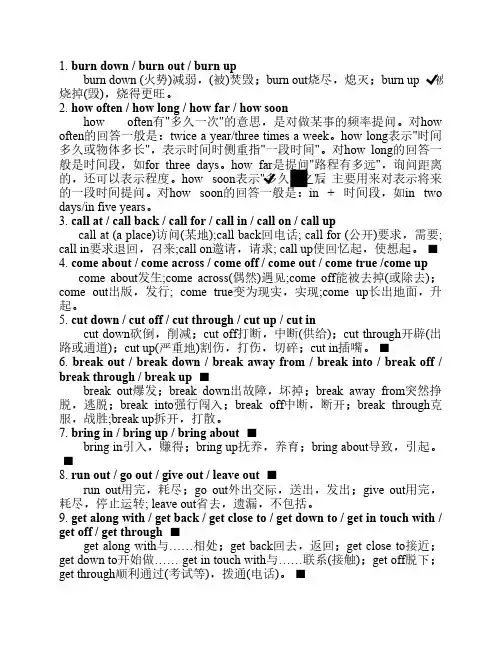
1. burn down / burn out / burn up burn down (火势)减弱,(被)焚毁;burn out烧尽,熄灭;burn up 被烧掉(毁),烧得更旺。
2. how often / how long / how far / how soon how often有"多久一次"的意思,是对做某事的频率提问。
对how often的回答一般是:twice a year/three times a week。
how long表示"时间多久或物体多长",表示时间时侧重指"一段时间"。
对how long的回答一般是时间段,如for three days。
how far是提问"路程有多远",询问距离",主要用来对表示将来的,还可以表示程度。
how soon表示"多久之后的一段时间提问。
对how soon的回答一般是:in + 时间段,如in two days/in five years。
3. call at / call back / call for / call in / call on / call upcall at (a place)访问(某地);call back回电话; call for (公开)要求,需要; call in要求退回,召来;call on邀请,请求; call up使回忆起,使想起。
4. come about / come across / come off / come out / come true /come upcome about发生;come across(偶然)遇见;come off能被去掉(或除去);come out出版,发行; come true变为现实,实现;come up长出地面,升起。
5. cut down / cut off / cut through / cut up / cut in cut down砍倒,削减;cut off打断,中断(供给);cut through开辟(出路或通道);cut up(严重地)割伤,打伤,切碎;cut in插嘴。
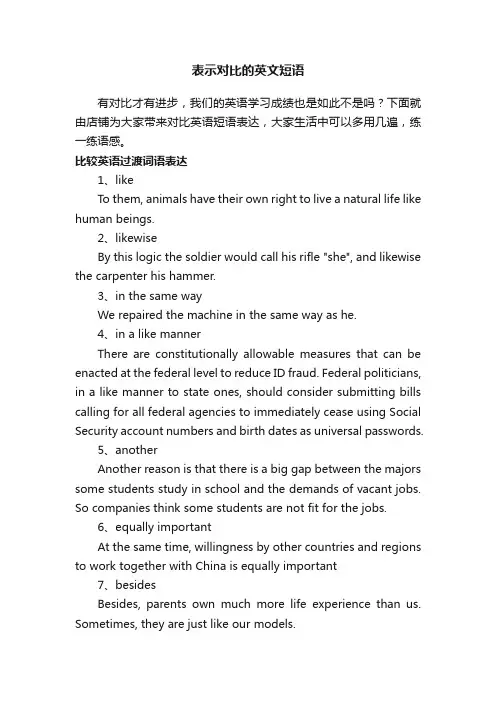
表示对比的英文短语有对比才有进步,我们的英语学习成绩也是如此不是吗?下面就由店铺为大家带来对比英语短语表达,大家生活中可以多用几遍,练一练语感。
比较英语过渡词语表达1、likeTo them, animals have their own right to live a natural life like human beings.2、likewiseBy this logic the soldier would call his rifle "she", and likewise the carpenter his hammer.3、in the same wayWe repaired the machine in the same way as he.4、in a like mannerThere are constitutionally allowable measures that can be enacted at the federal level to reduce ID fraud. Federal politicians, in a like manner to state ones, should consider submitting bills calling for all federal agencies to immediately cease using Social Security account numbers and birth dates as universal passwords.5、anotherAnother reason is that there is a big gap between the majors some students study in school and the demands of vacant jobs. So companies think some students are not fit for the jobs.6、equally importantAt the same time, willingness by other countries and regions to work together with China is equally important7、besidesBesides, parents own much more life experience than us. Sometimes, they are just like our models.8、in factThere is not enough energy, in fact, in many regions of China.9、furthermoreFurthermore, they should face their weak points so as to improve themselves and be more competent.This is exact the job that I’m looking for, which is totally in line with my major, and the salary is very tempting, too.11、thenI think after you become mature enough, then you can use your sharp eyes to recognize people, find who you really suit to, then, take it seriously.12、in addition toShe speaks five foreign languages in addition to English.13、for one thingFor one thing,with the increase in car ownership in recent years,the roads are becoming more and more crowded,often making the journey to work more of a nightmare than a dream.14、moreoverMoreover, you have risk to find the bad persons when chat in chat room especially women.15、at the same timeAt the same time, they will help us to shake off our demerit.16、accordinglySo you should change your search term accordingly.17、similarlySimilarly, a country, too, needs friends.对比英语过渡词语表达1、on the contraryOn the contrary, I have only just begun.2、on the other handOn the other hand, libraries should not refuse the latest information technology, which will enable them to regain those young readers.3、despiteDespite that, the majority of mid-aged people and senior citizens uphold the importance of the traditional performance.Yet there is no consensus on the development of private cars.5、unlikeUnlike people and dogs, cats are true carnivores.6、in contrastIn contrast, science/technology/ education and art/literature/poetry books only account for 10.8 percent and 5.1 percent separately.7、converselyConversely, many people have an ordor for pop music.8、howeverHowever, without perseverance, one’s success may be more dependent on luck than anything else.9、different fromLearning a language is different from learning math.10、in spite ofIn spite of all the above mentioned, I still favor owning a car.11、althoughNow although every minute is critical for this young life, his oiperation has been delayed for lack of money.12、butBut when I went home and read it carefully, I found in surprise that a few pages were missing, what’s worse, there are too many misprints.13、whereasIn conclusion, my idea is that just as there is no distinction between high culture and low culture, so it is inappropriate to say pop music belongs to the “lower” people whereas symphonies in a higher, loftier form of music.14、whileSome believe that they can learn best by listening to the advice of others, while others believe that it is better to learn through personal experience.15、neverthelessNevertheless, as every coin has two sides, studying abroad also confronts one with a series of hardships.16、insteadInstead, they should be allowed the freedom to arrange their own vacations. Only in this way can they really relax and refresh themselves for a new round of work.各种对比英语短语表达英语中表示比较的句型复杂繁多,表现形式多种多样,往往差之毫厘,谬之千里。
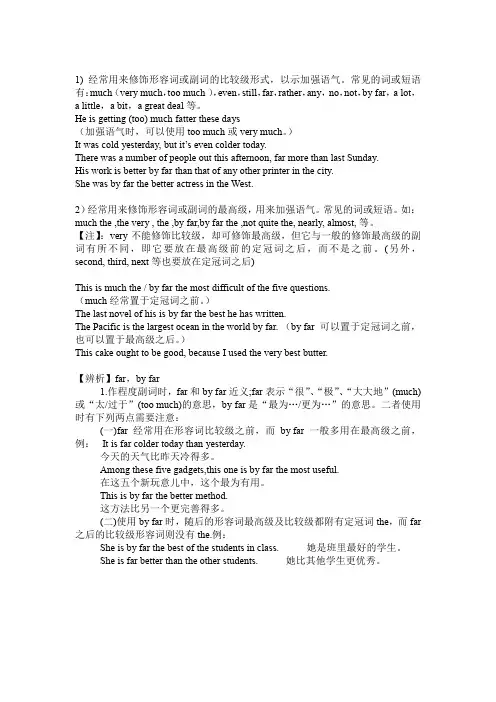
1) 经常用来修饰形容词或副词的比较级形式,以示加强语气。
常见的词或短语有:much (very much,too much ),even,still,far,rather,any, no,not,by far, a lot,a little,a bit,a great deal 等。
He is getting (too) much fatter these days(加强语气时,可以使用too much 或 very much。
)It was cold yesterday, but it’s even colder today.There was a number of people out this afternoon, far more than last Sunday.His work is better by far than that of any other printer in the city.She was by far the better actress in the West.2)经常用来修饰形容词或副词的最高级,用来加强语气。
常见的词或短语。
如:much the ,the very , the ,by far,by far the ,not quite the, nearly, almost, 等。
【注】:very不能修饰比较级,却可修饰最高级,但它与一般的修饰最高级的副词有所不同,即它要放在最高级前的定冠词之后,而不是之前。
(另外,second, third, next等也要放在定冠词之后)This is much the / by far the most difficult of the five questions.(much经常置于定冠词之前。
)The last novel of his is by far the best he has written.The Pacific is the largest ocean in the world by far. (by far可以置于定冠词之前,也可以置于最高级之后。
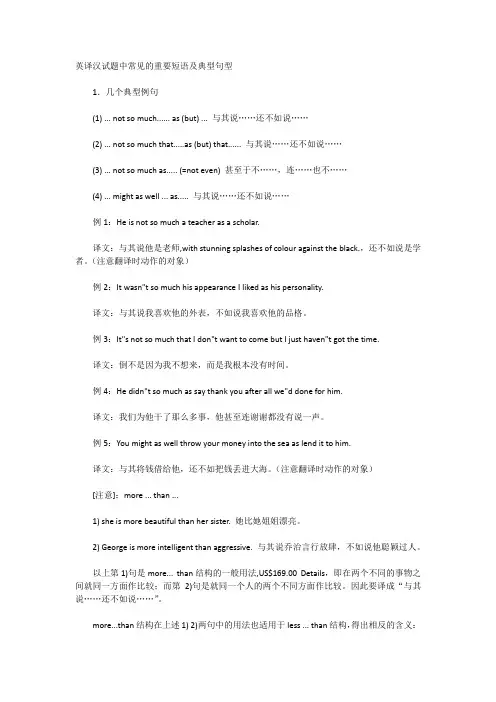
英译汉试题中常见的重要短语及典型句型1.几个典型例句(1) ... not so much...... as (but) ... 与其说……还不如说……(2) ... not so much that.....as (but) that...... 与其说……还不如说……(3) ... not so much as..... (=not even) 甚至于不……,连……也不……(4) ... might as well ... as..... 与其说……还不如说……例1:He is not so much a teacher as a scholar.译文:与其说他是老师,with stunning splashes of colour against the black.,还不如说是学者。
(注意翻译时动作的对象)例2:It wasn"t so much his appearance I liked as his personality.译文:与其说我喜欢他的外表,不如说我喜欢他的品格。
例3:It"s not so much that I don"t want to come but I just haven"t got the time.译文:倒不是因为我不想来,而是我根本没有时间。
例4:He didn"t so much as say thank you after all we"d done for him.译文:我们为他干了那么多事,他甚至连谢谢都没有说一声。
例5:You might as well throw your money into the sea as lend it to him.译文:与其将钱借给他,还不如把钱丢进大海。
(注意翻译时动作的对象)[注意]:more ... than ...1) she is more beautiful than her sister. 她比她姐姐漂亮。
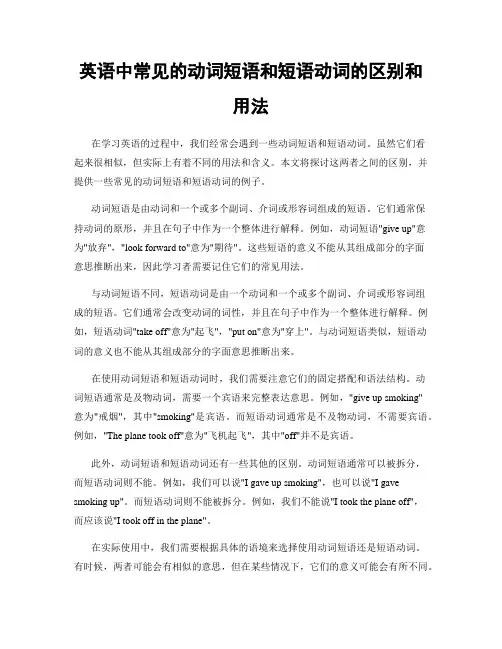
英语中常见的动词短语和短语动词的区别和用法在学习英语的过程中,我们经常会遇到一些动词短语和短语动词。
虽然它们看起来很相似,但实际上有着不同的用法和含义。
本文将探讨这两者之间的区别,并提供一些常见的动词短语和短语动词的例子。
动词短语是由动词和一个或多个副词、介词或形容词组成的短语。
它们通常保持动词的原形,并且在句子中作为一个整体进行解释。
例如,动词短语"give up"意为"放弃","look forward to"意为"期待"。
这些短语的意义不能从其组成部分的字面意思推断出来,因此学习者需要记住它们的常见用法。
与动词短语不同,短语动词是由一个动词和一个或多个副词、介词或形容词组成的短语。
它们通常会改变动词的词性,并且在句子中作为一个整体进行解释。
例如,短语动词"take off"意为"起飞","put on"意为"穿上"。
与动词短语类似,短语动词的意义也不能从其组成部分的字面意思推断出来。
在使用动词短语和短语动词时,我们需要注意它们的固定搭配和语法结构。
动词短语通常是及物动词,需要一个宾语来完整表达意思。
例如,"give up smoking"意为"戒烟",其中"smoking"是宾语。
而短语动词通常是不及物动词,不需要宾语。
例如,"The plane took off"意为"飞机起飞",其中"off"并不是宾语。
此外,动词短语和短语动词还有一些其他的区别。
动词短语通常可以被拆分,而短语动词则不能。
例如,我们可以说"I gave up smoking",也可以说"I gave smoking up"。
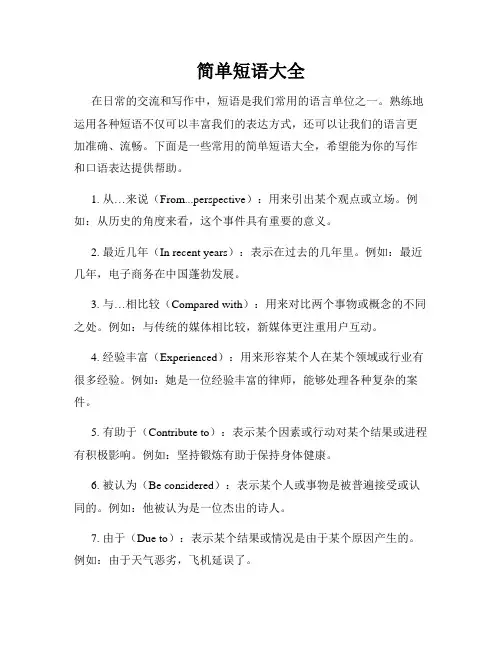
简单短语大全在日常的交流和写作中,短语是我们常用的语言单位之一。
熟练地运用各种短语不仅可以丰富我们的表达方式,还可以让我们的语言更加准确、流畅。
下面是一些常用的简单短语大全,希望能为你的写作和口语表达提供帮助。
1. 从…来说(From...perspective):用来引出某个观点或立场。
例如:从历史的角度来看,这个事件具有重要的意义。
2. 最近几年(In recent years):表示在过去的几年里。
例如:最近几年,电子商务在中国蓬勃发展。
3. 与…相比较(Compared with):用来对比两个事物或概念的不同之处。
例如:与传统的媒体相比较,新媒体更注重用户互动。
4. 经验丰富(Experienced):用来形容某个人在某个领域或行业有很多经验。
例如:她是一位经验丰富的律师,能够处理各种复杂的案件。
5. 有助于(Contribute to):表示某个因素或行动对某个结果或进程有积极影响。
例如:坚持锻炼有助于保持身体健康。
6. 被认为(Be considered):表示某个人或事物是被普遍接受或认同的。
例如:他被认为是一位杰出的诗人。
7. 由于(Due to):表示某个结果或情况是由于某个原因产生的。
例如:由于天气恶劣,飞机延误了。
8. 对于…来说(For):表示某个人或事物对某个情况的态度或影响。
例如:对于他来说,这个工作太简单了。
9. 难以想象(Hard to imagine):表示某个事物或情况非常令人惊讶或难以置信。
例如:面对如此美丽的风景,难以想象这是真实的。
10. 提供(Provide):表示某个人或机构给予他人某种帮助或资源。
例如:学校提供免费午餐给需要的学生。
11. 影响(Influence):表示某个因素对某个人或事物的作用或影响。
例如:网络的普及对人们的生活产生了巨大的影响。
12. 致力于(Be committed to):表示某个人或机构对某个目标或任务的承诺和投入。
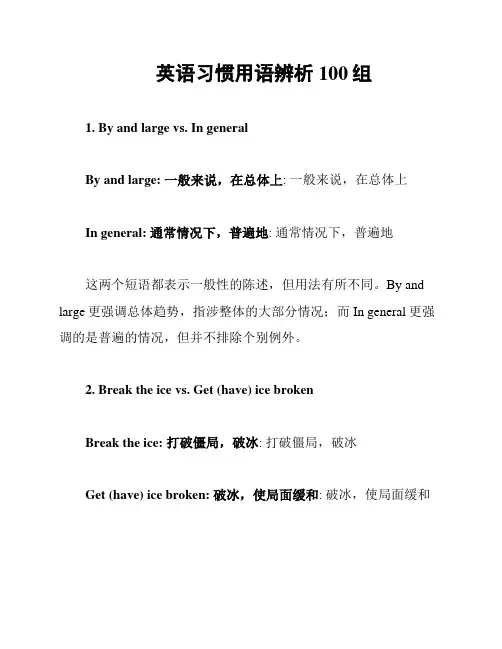
英语习惯用语辨析100组1. By and large vs. In generalBy and large: 一般来说,在总体上: 一般来说,在总体上In general: 通常情况下,普遍地: 通常情况下,普遍地这两个短语都表示一般性的陈述,但用法有所不同。
By and large更强调总体趋势,指涉整体的大部分情况;而In general更强调的是普遍的情况,但并不排除个别例外。
2. Break the ice vs. Get (have) ice brokenBreak the ice: 打破僵局,破冰: 打破僵局,破冰Get (have) ice broken: 破冰,使局面缓和: 破冰,使局面缓和这两个短语都指打开谈话或交往的局面,化解尴尬。
Break the ice强调的是采取行动来化解局面,而Get (have) ice broken则强调的是局面已经缓和。
...100. A blessing in disguise vs. A wolf in sheep's clothingA blessing in disguise: 因祸得福: 因祸得福A wolf in sheep's clothing: 羊皮狼,伪善的人或事物: 羊皮狼,伪善的人或事物这两个短语都指虽然外表看起来是一种情况,但实际上是另一种情况。
A blessing in disguise表示一种不被察觉的好事,虽然一开始看起来不好,但最终带来好处;而A wolf in sheep's clothing表示掩藏真实意图的虚伪,看似友善但实际上危险。
...以上是100组英语惯用语的辨析。
这些短语的恰当运用可以丰富英语表达,增加语言的生动性和准确性。
希望这份文档能对您有所帮助。
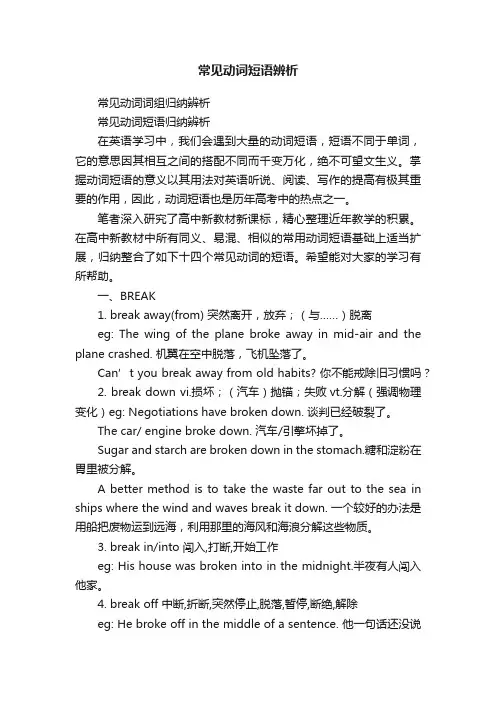
常见动词短语辨析常见动词词组归纳辨析常见动词短语归纳辨析在英语学习中,我们会遇到大量的动词短语,短语不同于单词,它的意思因其相互之间的搭配不同而千变万化,绝不可望文生义。
掌握动词短语的意义以其用法对英语听说、阅读、写作的提高有极其重要的作用,因此,动词短语也是历年高考中的热点之一。
笔者深入研究了高中新教材新课标,精心整理近年教学的积累。
在高中新教材中所有同义、易混、相似的常用动词短语基础上适当扩展,归纳整合了如下十四个常见动词的短语。
希望能对大家的学习有所帮助。
一、BREAK1. break away(from) 突然离开,放弃;(与……)脱离eg: The wing of the plane broke away in mid-air and the plane crashed. 机翼在空中脱落,飞机坠落了。
Can’t you break away from old hab its? 你不能戒除旧习惯吗?2. break down vi.损坏;(汽车)抛锚;失败vt.分解(强调物理变化)eg: Negotiations have broken down. 谈判已经破裂了。
The car/ engine broke down. 汽车/引擎坏掉了。
Sugar and starch are broken down in the stomach.糖和淀粉在胃里被分解。
A better method is to take the waste far out to the sea in ships where the wind and waves break it down. 一个较好的办法是用船把废物运到远海,利用那里的海风和海浪分解这些物质。
3. break in/into 闯入,打断,开始工作eg: His house was broken into in the midnight.半夜有人闯入他家。
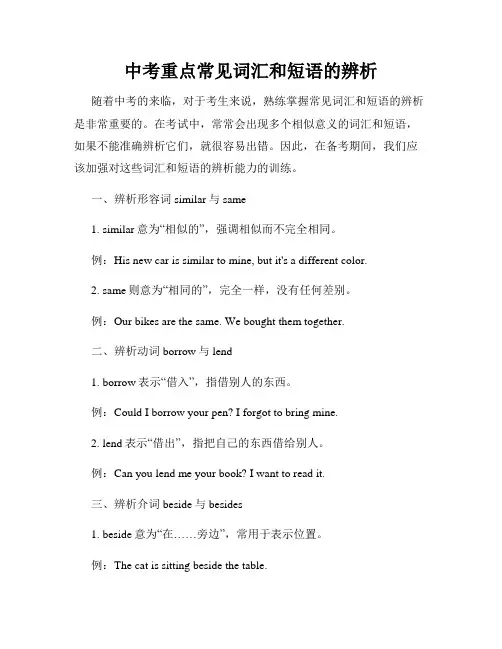
中考重点常见词汇和短语的辨析随着中考的来临,对于考生来说,熟练掌握常见词汇和短语的辨析是非常重要的。
在考试中,常常会出现多个相似意义的词汇和短语,如果不能准确辨析它们,就很容易出错。
因此,在备考期间,我们应该加强对这些词汇和短语的辨析能力的训练。
一、辨析形容词similar与same1. similar意为“相似的”,强调相似而不完全相同。
例:His new car is similar to mine, but it's a different color.2. same则意为“相同的”,完全一样,没有任何差别。
例:Our bikes are the same. We bought them together.二、辨析动词borrow与lend1. borrow表示“借入”,指借别人的东西。
例:Could I borrow your pen? I forgot to bring mine.2. lend表示“借出”,指把自己的东西借给别人。
例:Can you lend me your book? I want to read it.三、辨析介词beside与besides1. beside意为“在……旁边”,常用于表示位置。
例:The cat is sitting beside the table.2. besides意为“除了……之外”,常用于表示除了某事物或某人之外还有其他的事物或人。
例:Besides apples, we also have oranges.四、辨析动词learn与teach1. learn表示“学习”,指通过努力和训练获取新的知识或技能。
例:I learn English every day.2. teach表示“教”,指教授知识或技能给他人。
例:She teaches us math every Monday.五、辨析连词unless与if1. unless意为“除非”,相当于if not。
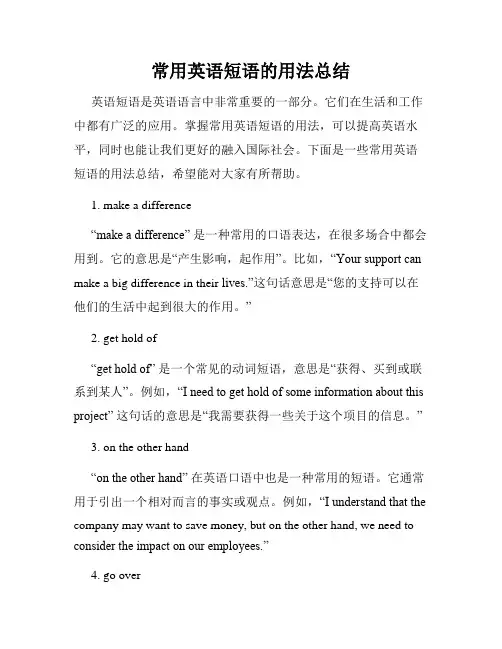
常用英语短语的用法总结英语短语是英语语言中非常重要的一部分。
它们在生活和工作中都有广泛的应用。
掌握常用英语短语的用法,可以提高英语水平,同时也能让我们更好的融入国际社会。
下面是一些常用英语短语的用法总结,希望能对大家有所帮助。
1. make a difference“make a difference” 是一种常用的口语表达,在很多场合中都会用到。
它的意思是“产生影响,起作用”。
比如,“Your support can make a big difference in their lives.”这句话意思是“您的支持可以在他们的生活中起到很大的作用。
”2. get hold of“get hold of” 是一个常见的动词短语,意思是“获得、买到或联系到某人”。
例如,“I need to get hold of some information about this project” 这句话的意思是“我需要获得一些关于这个项目的信息。
”3. on the other hand“on the other hand” 在英语口语中也是一种常用的短语。
它通常用于引出一个相对而言的事实或观点。
例如,“I understand that the company may want to save money, but on the other hand, we need to consider the impact on our employees.”4. go over“go over” 是一个常用的动词短语,意思是“检查,复习”。
例如,“Before you submit the report, please go over it one more time to make sur e there are no mistakes.”5. by the way“by the way” 是一种常见的短语,在口语和书面语中都可以使用。
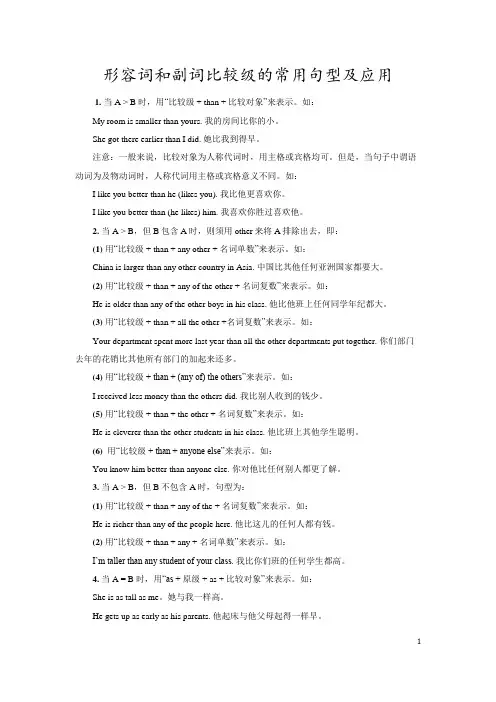
形容词和副词比较级的常用句型及应用1.当A > B 时,用“比较级 + than + 比较对象”来表示。
如:My room is smaller than yours. 我的房间比你的小。
She got there earlier than I did. 她比我到得早。
注意:一般来说,比较对象为人称代词时,用主格或宾格均可。
但是,当句子中谓语动词为及物动词时,人称代词用主格或宾格意义不同。
如:I like you better than he (likes you). 我比他更喜欢你。
I like you better than (he likes) him. 我喜欢你胜过喜欢他。
2.当A > B,但B包含A时,则须用other来将A排除出去,即:(1)用“比较级 + than + any other + 名词单数”来表示。
如:China is larger than any other country in Asia. 中国比其他任何亚洲国家都要大。
(2)用“比较级 + than + any of the other + 名词复数”来表示。
如:He is older than any of the other boys in his class. 他比他班上任何同学年纪都大。
(3)用“比较级 + than + all the other +名词复数”来表示。
如:Your department spent more last year than all the other departments put together. 你们部门去年的花销比其他所有部门的加起来还多。
(4)用“比较级+ than + (any of) the others”来表示。
如:I received less money than the others did. 我比别人收到的钱少。
(5)用“比较级 + than + the other + 名词复数”来表示。
compare短语在许多英文句型中,“compare”短语是非常重要且经常用到的一项。
这一表达方式提供了许多有效地评论和比较,可以直接说出两个事物之间的关系,并可以清晰而有力地描述它们。
下面就对“compare”短语做一个更深入的了解,并且举出一些相关的例子。
首先,“compare”短语的使用最常见的是“compare to”(相比、拿来比较)、“compare with”(与……相比)、“compare among”(在……中比较)和“compare among”(在……之间比较)。
这些用法的根本区别在于一个是把一件事物拿来和另一个事物比较,一个是拿一件事物去和许多其他事物比较。
下面来看一些例子:1. I compared my score on the test to Alex, and I was surprised to see that I did better.(我把自己在考试上的分数和Alex的分数比较了一下,结果惊讶地发现我做得更好。
)2. I compared my new shirt with the old one and noticed a few minor differences.(我把我新买的衬衫和旧衬衫拿出来比较了一下,发现有几个细微的不同。
)3. I compared the prices of different restaurants among the city.(我把不同餐厅在这座城市的价格拿出来比较了一下。
)4. I compared the prices of the same item among different stores.(我把同一件物品在不同商店的价格拿出来比较了一下。
)其次,无论比较的事物是什么,只要它们有关系,就可以用“compare”短语来表达。
一些典型的比较对象可以是价格、价值、口味、速度、外观等等。
下面也举出一些例子,来更深入地理解一下“compare”短语的用法。
生活中常见的短语生活中,我们经常与人交流,使用各种表达方式来传递自己的意思。
在这个过程中,短语是我们非常常见的一种表达形式。
短语是由一组相关的词语组合而成,具有固定的意义。
在本文中,我们将探讨一些生活中常见的短语,包括其含义和用法。
1. "一言不合":这个短语表示两个人一说话就吵架或者产生争执的情况。
通常用来形容两个人之间关系紧张或者彼此不合的情况。
2. "不可思议":这个短语用来形容某个事情非常奇怪或者难以理解。
当我们遇到一些超出我们认知范围的事情时,就可以用这个短语来表达。
3. "冰冻三尺,非一日之寒":这个短语用来形容某些事情的发展或者问题的产生并非一日之功。
意思是,某个结果的形成需要经过长时间的积累和沉淀。
4. "知难而退":这个短语表示面对困难和挑战时选择主动放弃或者避免。
通常用来形容某个人在面对困难时放弃继续努力的情况。
5. "形影不离":这个短语用来形容两个人或者两个事物紧密联系在一起、无法分割开。
通常用来形容亲密的关系或者物品与其主人的紧密关联。
6. "万事如意":这个短语用来祝愿某个人在未来的事情中一切都能够朝着自己的意愿和计划顺利进行。
通常用于新年或者节日祝福语中。
7. "一心一意":这个短语表示某个人专注于某个事情,全身心地去追求和完成。
通常用来形容某个人做事专注、不分心的情况。
8. "舍得"和"不舍得":这两个短语用来形容某个人是否愿意放弃某个物品或者某个人。
"舍得"表示愿意放弃,"不舍得"表示不愿意放弃。
9. "言而无信":这个短语用来形容某个人说话不算数,经常不信守承诺的情况。
通常用于形容某个人没有信用或者不可信赖。
10. "好好学习,天天向上":这个短语用来鼓励人们勤奋学习,不断进步。
2022-2023学年中考英语常见易混单词短语用法辨析(三)常见易混词用法辨析一、peaceful和peaceable这两个词都是peace的派生形容词,它们又都(表示)“和平的”、“安静的”(涵义),但涵义和使用场合有所不同。
1.peaceful是专指环境和状态而言,其涵义为“平安的”、“和平的”、“宁静的”、“平静的”。
例句:We earnestly hope that all countries will adhere to the principles of peaceful coexistence.我们真诚地希望世界各国都能坚持和平共处的原则。
In breaking up strikes,we prefer peaceful measure to coercion.要制止罢工,我们最好使用和平的方式而不要采用强制的方法。
What a peaceful evening!这是一个多么宁静的夜晚!2.peaceable专指人的性格和气质而言,它的涵义是“爱好和平的”、“不爱争吵的”、“喜爱安静的”。
例如:The old woman has a peaceable temper.这个老妇的脾气温和。
Her husband is a peaceable man.她的丈夫是个平和的人。
The inhabitants in Switzerland are peaceable citizens.瑞士的居民都是爱好和平的人。
二、out of question和out of the question这一对片语仅差一字之微,涵义却大相径庭。
1.out of question的意思是“毫无疑问”,它是副词性短语,修饰谓语动词或整个句子。
其义相当于beyond question,beyond doubt。
例句:The general trend of the situation in Bosnia is out of question,developing in a direction more favourable to peace.毫无疑问,波斯尼亚形势的总趋势是朝着更加有利于和平的方向发展。
形容词和副词比较等级的常见句型(一)原级1.“as+原级+as”,表示两者之间在某一方面程度相同时,“……和……一样……”例如:(1)Art is as interesting as music. 美术和音乐一样有趣。
(2)I have as many English books as he has. 我有的英语书和他一样多。
(3)Miss Gao works as hard as Mr.Wang. 高小姐和王先生工作一样努力。
2.“not as(so)+原级+as”,表示两者之间在某一方面程度不相同时,“……和……不一样……”例如:(1)My father gets up not as/ so early as my mother. 我爸爸没有我妈妈起床早。
(2)Jim is not as/so tall as Tom. 吉姆没有汤姆个子高。
3.“……倍数+as…as…”表示“是几倍”例如:Six is twice as much as three. 六是二的两倍。
(二)比较级1.“含有在比较级的主句+than+从句”(从中常省去和主句相同的部分。
)例如:(1)The work is more difficult than you thought. 这工作比你想象的要难。
(2)The boy ran faster than the girl(ran). 那男孩比女孩跑得快。
2.有时,在形容词比较级前加much,still,far,even,a lot,a little等状语,表示“更(还)……”等意思。
例如:(1)This kind of TV is a little more expensive than that one. 这种电视机比那种贵一点。
(2)Our life is much better than ever before. 我们现在的生活比以前好多了。
3.形容词比较级前加“two years,three feet,…”等状语来修饰。
高考英语常见动词短语积累归纳总结look 的常用短语:look up … in查找look sb. up and down 上下打量look back to/ upon回顾look upon…as把…看作look forward to期待look through浏览; 看穿take a new look呈现新面貌fear的常用短语:in fear害怕地(be) in fear of 害怕for fear of/ that担心;生怕concentrate 的常用短语:concentrate on 专心…concentrate one’s mind on 专心于…类似的短语:fix one’s mind uponfocus onput one’s heart intofocus one’s mind onsurprise常用短语:in surprise惊讶地to one’s surprise 使某人惊讶的是be surprise at/to do/that 对某事感到惊讶表示“穿衣”的动作或状态的词和短语1.表示动作的有:pull on put on dress dress sb2. 表示状态的有:wear be in be dressed in have … on常见表“喜欢”的短语和单词likecare forbe keen onbe fond oftake delight in…trouble的常用短语:have much trouble / no trouble (in) doing 在…有/没有困难take great trouble to do 不辞辛劳做某事put sb to the trouble of doing …为难某人做某事make trouble捣乱be in (great) trouble 惹麻烦;处在困境中help sb. out of trouble 帮某人摆脱困境end的常用短语:come to an end……结束put an end to 结束……on end竖起, 连续in the end终于; 最后end up (by) doing…以……结束make both ends meet收支相抵表示“导致”、“由…引起”的短语:1. 导致cause sth. (to do)result inlead to2. 由……引起be caused byresult fromgrow out oflie in表“全力以赴”的短语:do / try one’s bestspare no efforts to dotake great pains to dogo all out to dodo what somebody can (do) to dodo all somebody can (do) to do direction常用短语:in (the ) direction of….朝……方向under the direction of ...在……的指导下follow the directions照说明去做far常用短语:far from (being)离……要求相差很远far from +(a place)距离某地很远far away遥远so far 到目前为止; 那么远as far as sb. knows/sees据某人所知by far (最高级前,比较级后)起强调作用distance常用短语:in the distance在远处from/ at a distance从远处keep sb. at a distance于某人保持一定距离It is no distance at all.不远use常用短语:used to do过去曾经、常做be used to doing …习惯于……be used to do被用来做……make good/ full use of充分利用……come into use开始使用……it is no use doing …干……没有用“出了什么事”的几种不同表达What’s wrong with….?What’s the matter with…?What’s the trouble with…?What happened (to sb.) ?“众所周知”常用表达法:It is known to all that…主语从句,that不能省As is known to all,定语从句,置于句首We all know (that)后接宾语从句Everyone knows (that)后接宾语从句, which is known to all.非限定从句,置于句末表“同意某人意见”的常用短语:agree with sb. /what sb. said agree to sth. approve (of) sth.subscribe toin favour of sth.be agreeable to sth.be for sth.“不同意”disagree with sb./ what sb. saidobject to sth.disapprove (of) sth.be against sth.sign的常用短语:sign one’s name签名sign to sb (not) to do sth. 示意某人(不)做某事signs of ………的迹象trap常用短语be caught in a trap落入圈套be led into a trap中圈套set a trap to do sth.设圈套……be trapped in sth.被…..所围困grow常用短语in the grow of在….成长中grow up长大; 成长grow rich on靠….. 变富grow into长成……grow out of由…..引起/滋生出make常用短语make up for弥补be made from/ of由……造成make up编造;组成;化妆be made into制成……make fun of取笑; 嘲弄make a living 谋生be made up of =consist of 由……组成supply, provide, offer 的区别:1.表示“向某人提供某物”supply / provide sb. with sth.supply / provide sth. for sb.supply sth. to sb.offer sb. sth.2. 表示“主动提出做某事”offer to do sth.3. 表示“倘使”、“假如”provided / providing that= on condition that=only if4. 表示“满足需要”supply / meet a need.supply的常用短语in short supply 缺乏,不足medical/military supply医疗/军用品supplies of…许多lack的常用短语be lacking in sth. 在……不足make up for the lack of 弥补……的不足for/by/from/through lack of…由于…不足,缺乏have no lack of不缺damage的常用短语do damage/harm to 对……有害cause damage to 对……造成损害ask for damage要求赔偿die of 与die from 的区别die of 表示“死于……病”或冻死、气死,或死于过度悲伤。
die of cancer/grief/hunger/anger/colddie from表示死于外伤、事故、劳累过度。
如:die from polluted air/overwork/sword thrustdie常用短语die for one’s country为国捐躯die down熄灭、平息die off绝种、枯死die away消逝、静下来die a heroic death英勇牺牲threaten常用短语threaten sb. with sth.用……威胁某人threaten to do…威胁做……under the threat of…在……的威胁下speed常用短语speed up加速at the speed of…以…..的速度with great speed迅速aim常用短语take aim at瞄准reach an aim达到目的aim at瞄准、针对permit与allow 的区别表“允许做某事”或“允许某人做某事”用法基本相同。
permit/allow doing sth.permit/allow sb. to do sth.permit /allow of sth一般在独立主格结构中表示“时间、条件等许可”,多用permit Time/Weather permitting, I’ll drop in on her.allow 还可以表示“承认”、“考虑到”。
例如:1. We allow him to be wronged.2. will take an hour to go there, allowing for traffic delays.means常用短语by means of通过….., 靠……by this means/ in this way用这种方法by no means/in no case决不by all means用一切办法keep常用短语keep up with紧跟…..keep sb. doing sth.让某人一直做keep sb. from doing sth.阻止…..做……keep off the grass勿踏草地keep to the point紧扣主题keep in touch with与……保持联系mark常用短语make one’s mark成功、出名be marked with标明gain/get full marks for ……得满分seat常用短语take one’s seat坐下have a seat请坐see/find sb. seated看见/发现某人坐在….be seated就座, 坐着seat oneself in/at/on使自己坐在……部分动词+ to + doing 的用法look forward to get down to object todevote… to…pay attention to prefer…to…give常用短语give up放弃give in让步\屈服give off 散发出give away赠送、泄漏give rise to 引起……give out 疲劳、用完、散发出fit常用短语be fit for适合keep fit/keep healthy保持健康be fit to do 适合于…..fit in with适应……a nice fit合身的衣服…fit sb.某人穿….. 合身reach 常用短语reach an agreement达成协议reach for…伸手去拿/够……within / out of reach够得到/够不着reach sb’s understanding 使某人明白feed常用短语feed sth. to sb/feed sb. on sth. 用……喂养……be fed up of…/ be tired of…/ be bored with…对……感到厌倦feed on以……为食mercy常用短语without mercy残忍地have mercy on /upon 对……表示怜悯at the mercy of任凭摆布beg for mercy 乞求饶恕exist常用短语exist in/lie in/consist in存在于……in existence 现存的come into existence/ come into being 形成opinion常用短语in one’s opinion =in the opinion of sb.在某人看来have a high/ low opinion of 对……评价高/低give one’s opinion on 对……谈自己的看法persuade常用短语persuade sb. to do = persuade sb. into doing 说服某人做某事try to persuade sb. to do 试图说服某人做某事persuade sb. to sth. 说服某人同意某事engage 常用短语be engaged to sb. 与某人订婚be engaged in sth. = be engaged doing sth. 忙于……, 从事某事wide 与broad 的区别它们均可以表“宽”和“广阔的”a river 50 feet wide/ broad指身体部位“宽肩、宽背”一般用broad, 表示“睁大眼睛、张大嘴巴”一般用wide。